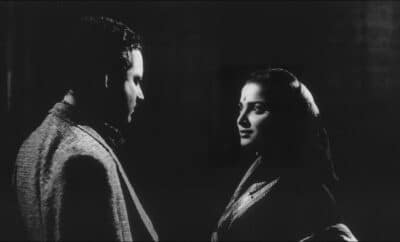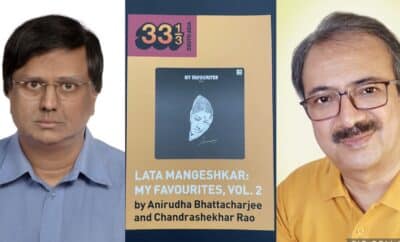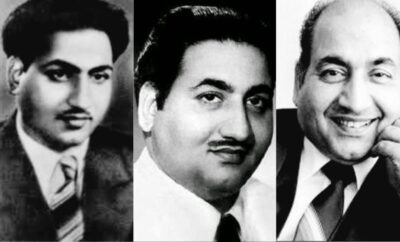Song Sketch
O Beqaraar Dil – Kohraa – The Restless Relish
Sometime back I got introduced to a new word – Vorfreude, which means the joyful, intense anticipation that comes from imagining future pleasures. Being happy in anticipation of what is coming!! How many of us bask in this intuitive happiness? But if there’s pleasure in anticipation, then there might be trouble too. Anxiety and anticipation are two sides of the same coin. For as Alfred Hitchcock said – “There’s no terror in the bang, only in the anticipation of it.” Usually it is the anticipation that runs faster than the reality, making us excited, eager, delighted. But what if it is full of anxiety? The apprehension, the worries, the angst surrounding it take away all our quietude and calmness. There’s that constant restlessness enveloping us. It might be about anything. There are things which you know they will give pleasures in future, but yet you are anxious. May be because it might be for a brief period and might not last long. Or it might give you sorrows after its gone. Ahh that uneasiness, restlessness!! Waiting makes it better but you are not ready to take risks. You feel safe not really wanting it. You feel safe not leaving your comfort zone. That perpetual tug of war between mind and heart. And it is the heart that suffers mostly. But it is about enjoying life so wishing your today away in anticipation for a better tomorrow looks impractical. When you are anticipating love, the anxiety might be in 10 folds. Mind not wanting you to be there, but the heart is uneasy. And you try to pacify it –
O beqaraar dil
Ho chuka hai mujhko aansuon se pyar
Mujhe tu khushi na de, nayi zindagi na de
O beqaraar dil….
It begins with that hypnotic ha ha ha aa aaaa…by Lata Mangeshkar and you start to relish the restlessness. The violins soar up the feelings, while the nature echoes that restlessness.
I don’t want that new life, I don’t want that so called happiness, O restless heart, I love my tears (because they are mine). I love my present life even if it is full of worries. These worries are mine and I relish them instead of the alien happiness.
Beautiful flow of unrestricted thoughts from Kaifi Azmi’s pen. It speaks out of the usual confinements of joys and sorrows. Beseeching for the sorrow instead of happiness.
Kohra (1964), the Indian version of Daphne Du Maurier’s classic mystery Rebecca. Produced by Hemant Kumar, directed by Biren Nag, it stars Waheeda Rehman and Biswajeet in lead roles and spiced up by the imperious attitude of Lalita Pawar. Last but not the least, the existence of Biswajeet’s dead wife, which adds to the spooky quotient of the film. The music by Hemant Kumar is the highlight with Lata Mangeshkar adding to the haunt quotient with Jhoom jhoom dhalti raat. Kaifi Azmi complements the music with his stunning lyrics. The short but sweet first interlude is decorated with beautiful flute combinations.
Mili chaman ko bahaar
Hansi phool ko mili
Geet koyal ko mile
Aur maine paayi khamoshi
Mujhe bansuri na de, koi raagini na de
O beqaraar dil….
The garden has got spring as its companion, the flowers have their blooms and the birds have their songs and chirping. But I have got an eerie silence in life, with no companion. But I love this quietude. I do not need any music in form of love. I do not need the support of that anticipated love.
Even if she’s asking for tears and sorrows, she’s not brooding. Her thoughts are not cramped. It is this freedom that she enjoys.
As if that tranquility isn’t enough, Lata Mangeshkar again hypnotises in the 2nd interlude with ha ha ha aaa aaa. The flow of the song suddenly changes its course with the flute again leading the way.
Aaye ghata ghir ke ghata chhaye
Aur pyaasi kali gham ki jali
Taras taras jaaye
I might be like the bud which is thirsty for the raindrops. The thirst of the flowers is quenched by the dark clouds and their downpour. But I enjoy the longing.
Rahe sadaa jo mera, wahi meri zindagi
Hai roz andhera aur char din ki chandni
Mujhe chandni na de, nayi roshni na de
O beqaraar dil…..
The one who is mine forever shall be my life, in my life. But my life has darkness forever where light of love is just ephemeral. I don’t need these fleeting moments of love, don’t bless me with stars and light.
https://www.youtube.com/watch?v=KxOGhSp1oEU
A mesmerising composition in Raag Bhimpalasi, which is an exclusive afternoon raag. The sweetness of this raag has the ability to pierce into the heart of the listeners and stay there. It haunts till we get trapped in its melody. While in the Hindi version it is through Lata’s voice, its original Bengali version has Hemant Kumar himself. This version is from the Bengali movie Neele Akasher Neeche (1959) based on Mahadevi Verma’s story Cheeni Feriwaala, directed by Mrinal Sen. The film has a poignant, philosophical number which addressed to a river. Hence the song O Nodi re ekti kothai shudhaai shudhu tomare….., asking the river about its flow, its origin.
The Bengali version has also been adapted for the English movie Siddhartha (1972) by Conrad Rooks, starring Simi Garewal and Shashi Kapoor.




Victor
January 18, 2019 at 2:23 am
Lovely song and great analysis. In my view, the Bengali original is even better, because of Hemantda’s divine rendition, Gauriprasanna’s lyrics, Mrinal Sen’s awesome direction coupled with Kali Banerji’s sensational performance as a Chinese Hawker in the film.
Deepa
January 20, 2019 at 11:56 am
Thank you. I agree with you. I love the Bangla version more. Hemant Kumar’s baritone is out of the world!!
Virendra Gosain
October 2, 2021 at 10:04 am
Hemant Kumar has weaved magic with some haunting melodies set in Bhimplasi.The analysis deserves approbation.
Subramanian
February 2, 2023 at 10:40 am
Fine .Very nice details.